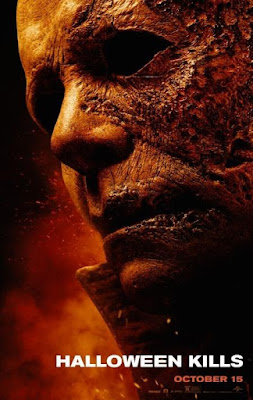It is a trilogy, so that means it is supposed to end, conclusively. Of course, in horror, they have a habit of turning into quartets and quintets, as in the case of Scream. In this case, the Halloween rights will revert from Blumhouse to Malek Akkad, the son of the original producer, Moustapha Al Akkad, following the completion of David Gordon Green’s retconned trilogy. Laurie Strode thought she finally trapped Michael Myers in Halloween (2018), but the bogeyman escaped to take his revenge on the entire town of Haddonfield in Halloween Kills. Four years later, Strode and her granddaughter Allyson Nelson are still wondering if and when Myers will return to kill again, which of course he does in Green’s Halloween Ends, releasing today in theaters and on Peacock.
Myers’ last Halloween rampage was a brutal one. Amongst his victims was Strode’s daughter Karen Nelson. Since then, Strode has relaxed a little, finding therapeutic value in writing her memoirs. She is still a bit of an outcast, so she has sympathy for Corey Cunningham, who accidentally killed the bratty kid he was babysitting on a non-Michael Myers Halloween a few years earlier, during the unsatisfying prologue.
Nelson is also interested in the moody Cunningham, but their dating attempts constantly lead to confrontations with Haddonfield’s bullies. After one particularly nasty beating, the town’s most notorious outsider takes Cunningham under his wing. Soon, he and Myers are hunting together, but he still pursues a relationship with Nelson, even though Strode can sense he is under Myers’ influence.
Compared to the previous films in Green’s Halloween trilogy, Ends is a major disappointment. Whereas the first two films were big, grandly chaotic, and intensely exhausting, the new film just feels small. Kills graphically depicted the way Myers’ evil precipitates the entire social breakdown of Haddonfield. End half-heartedly tosses around themes of trauma and recovery, but it is more of an afterthought than a driving concern. For franchise fans, Cunningham also takes far too much screen-time away from Myers.



